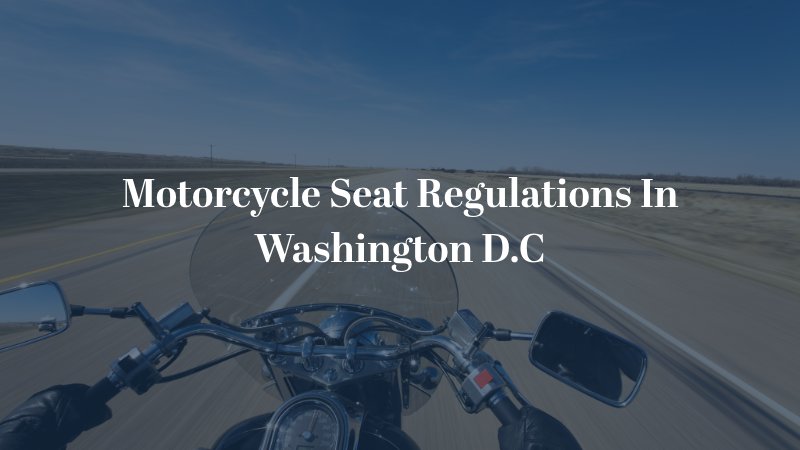Welcoming the many benefits of motorcycle riding also means understanding Washington D.C. ‘s motorcycling laws. These are designed to ensure your safety, as well as that of others on the road.
Washington D.C. classifies a vehicle as a motorcycle if it’s powered by two or three wheels and possesses certain characteristics – one or more of the following:
- “Piston displacement of more than fifty (50) cubic centimeters
- Capable of traveling over 35 miles per hour on level ground
- More than one and one-half (1.5) brake horsepower (S.A.E. rating)
- Wheels under 16 inches in diameter
- Manual transmission”
Legal Requirements to Operate a Motorcycle in D.C.
To legally operate this kind of vehicle, you must be at least 18 years old with an existing valid D.C driver’s license. You’ll need to pass two additional tests – first is proving your knowledge about safe motorcycling rules through the written test, and second is demonstrating practical skills during an observed ride either conducted by DMV officials themselves or validated through certification from an approved Maryland or Virginia course.
Motorcyclists Must Wear Helmets in Washington, D.C.
There are other safety regulations in D.C. as well. The law mandates that all motorcyclists wear approved protective helmets and eye protection while riding.
The stipulated helmet must be worn in the manner for which it was designed, meaning properly secured to your head with any provided straps or harnesses. Importantly, such headgear should be of a type that is approved by designated authorities.
“No person shall operate or ride upon a motorcycle or motor-driven cycle unless wearing a protective helmet in the manner for which the helmet was designed and of a type approved by the Director.”
In addition to wearing a suitable helmet, goggles or a face shield are also required while motorcycle riding within D.C. This prevents objects from hitting unprotected eyes which can cause severe damage even at moderate speeds.
“No person shall operate a motorcycle unless he or she wears goggles or a face shield of a type approved by the Director.”
Failure to comply with these safety regulations can result in a fine of $75.

Motorcycle Seat Regulations in Washington D.C.
As an operator, you must ride on the permanent and regular seat attached to your motorcycle. This ensures a stable and comfortable base from where you can control the motorcycle effectively.
Additionally, carrying passengers on motorcycles is permitted only if your vehicle has been specifically designed for that purpose with provisions like an added seat alongside proper grab handles and foot rests.
A violation of this rule could lead to a fine of $25.
“A person operating a motorcycle or motor-driven cycle shall ride only upon the permanent and regular seat attached, and the operator shall not carry any other person nor shall any other person ride on a motorcycle or motor-driven cycle unless the motorcycle or motor-driven cycle is designed to carry more than one person.”
Motorcycle Inspections in Washington, D.C.
Washington, D.C. law requires motorcycles to undergo emissions inspections every two years. This checks your vehicle’s exhaust system for the presence of harmful pollutants that exceed allowable levels – a crucial step in protecting our environment while maintaining road safety.
Lane Sharing is Illegal in Washington, D.C.
The practice of occupying the same lane simultaneously, known as ‘lane sharing’, is typically considered illegal in Washington D.C. This rule applies to both cars and motorcycles under the premise that each vehicle type requires a full lane for safe operation.
Contact a Washington D.C Motorcycle Accident Lawyer For Help
Navigating the aftermath of a motorcycle accident can be overwhelming. Seeking advice from a Washington D.C. motorcycle accident attorney who not only answers your questions but lays out clear next steps to secure justice if you’ve been wronged. Contact us today to schedule a free consultation.